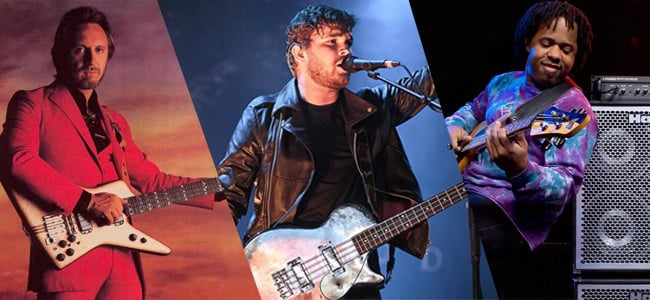Q: What do you call someone who hangs around with musicians? A: A Bass guitarist.
Pity the bass guitarist. The music world has no trouble making fun of them.
Quips like the one above hint at the mentality that bassists are somehow less skilled than other musicians by virtue of the instrument they’ve chosen.
It’s a misconception, but a powerful one: Bassist’s past and present struggle to receive the attention of their guitar and drum-playing counterparts. Heck, if you walk down Melbourne’s Swanston Street on any given night, you’d be forgiven for thinking a bass guitarist needs to dress like rabbits and dance the Hopak to get any attention at all.
In the spirit of changing this mindset, here are nine ‘bass heroes’ who have revolutionised and generally played the hell out of the bass.
John Entwistle (The Who)
Love Music?
Get your daily dose of metal, rock, indie, pop, and everything else in between.
Like most bassists of his era – particularly Jack Bruce (Cream) and John Paul Jones (Led Zeppelin) – Entwistle was a phenomenal musician whose importance is still consistently overlooked.
This wasn’t hard, given a crazy-good drummer, a flamboyant guitarist and a singer with a beastly voice were the other members of the Who, and Entwistle always stood rigidly still on stage while they twirled and leapt about.
But Entwistle’s bass playing is perhaps the best rock music has known. Check out his short and sweet live solos, huge groovy studio tones (‘Talkin’ ‘bout Your Generation’), and bass lines that simultaneously held the whole band together and sound like a lead instrument when isolated (above).
Geddy Lee (Rush)
I felt duty-bound to include the late Lemmy on this list as the best bass guitarist-frontman in history, but in the end it’s another Rickenbacker player that takes the gong.
That Lee’s bass playing consistently shines through on songs that also feature the best drummer in history (Neil Peart) is impressive in its own right. That he manages to do it while also handling keyboards and vocals (and what vocals) is on another level entirely.
Cliff Burton (Metallica)
It speaks volumes of Burton’s talents that by the time he was tragically killed in a bus accident at only 24, he’d already cemented his legacy as the best bass guitarist in metal’s history.
The guitars and drums on Metallica’s first three albums tend to the ferocious and unrelenting, but Burton’s bass playing and intelligent use of effects pedals summons a much wider spectrum of emotions. In the studio, “Orion” is his masterpiece. Live, his solos were always show-stoppers.
Jaco Pastorius
For guitarists it’s Hendrix, for drummers Buddy Rich. For bassists, it’s Jaco Pastorious that is widely accepted to be the best musician ever to play the instrument (though he actually started out as a drummer).
Like Burton, he died tragically, after a fight with a bouncer outside a Florida club in 1987 at the age of 35. Nonetheless, the years playing with jazz-fusion artists like Herbie Hancock and Ian Hunter, plus his solo career from 1976, held enough time for him to revolutionise bass guitar playing.
Pastorius created mesmerising melodies through his use of harmonics and unique phrasing, and explored the range of sounds a bass can produce like none had before him.
Victor Wooten
It’s a coincidence that Wooten found a worldwide audience only a few years after Pastorius passed away, but it meant the position of unbelievable bass guitarist wasn’t left vacant for long.
Wooten has been making people’s jaws drop since 1990 with his technically unmatched bass playing fusing Jazz, Funk, R’n’B and Bluegrass. He has won five Grammys across his solo career and as part of supergroup trio Bela Fleck and the Flecktones, and regularly plays with the Dave Matthews band.
Flea
Flea has been the nucleus of the Red Hot Chilli Peppers alongside singer Anthony Kiedis for the length of the band’s career, and is arguably the reason the band has remained so cohesive an outfit across its many reincarnations.
Whether through being one half of one of rocks punchiest rhythm sections with drummer Chad Smith, his slap-bass tones that perfectly complement Kiedis’ rap-style vocal delivery, or his melodic duets with guitarist John Frusciante on songs like ‘Californication’ and ‘Breaking the Girl’, the Melbourne-born Flea is a testament to versatility and indispensability of a good bassist.
Les Claypool (Primus)
While Primus is best known for being the band behind the South Park theme and writing weird, nonsensical songs like “Mary the Ice Cube”, the slap-bass work of frontman Claypool has been nothing short of game-changing.
Check out the video, where his use of effects and the thumb side of his palm turns his instrument into a de facto turntable.
John Myung (Dream Theater)
Like his band, Myung’s bass playing is progressive, crossing genres and emotions sometimes in the same song.
He’s a hero with bass lovers for being technically faultless, able to extract a different tone from every finger he uses, and equally admired the his musical nous he displays in giving his solos and basslines room to breathe.
A master of scales and fingerstyles from jazz to metal, Myung was crowned “best bassist of all time” by a MusicRadar poll in 2010.
Mike Kerr (Royal Blood)
The Winter of 2014 saw the music world say a collective “How the hell’s he doing that?” when they found out Royal Blood’s frontman was making a noise that sounded like 10 guitars using four thick strings.
Kerr has also brought new ideas to the table regarding how to incorporate bass solos into songs – his favourite technique is to play notes higher up the fretboard while the drums get quieter.
Popular rock bands have been tending towards fewer members since the White Stripes, but now the bass is a lead instrument of one of these bands perhaps a deeper respect for the capabilities of the bass, and its players, will follow.

































